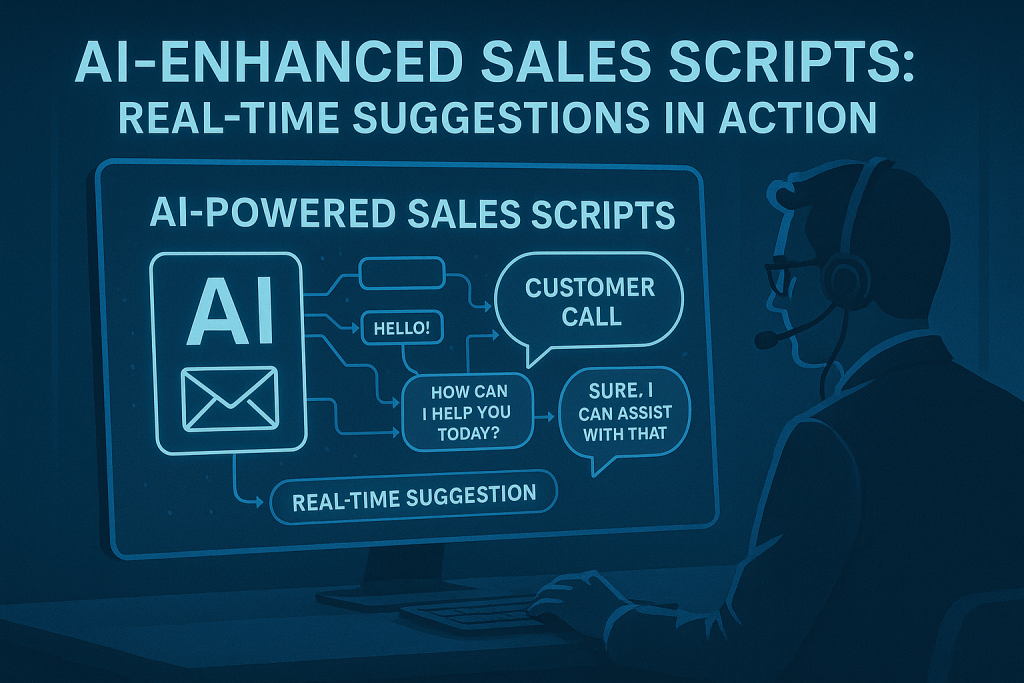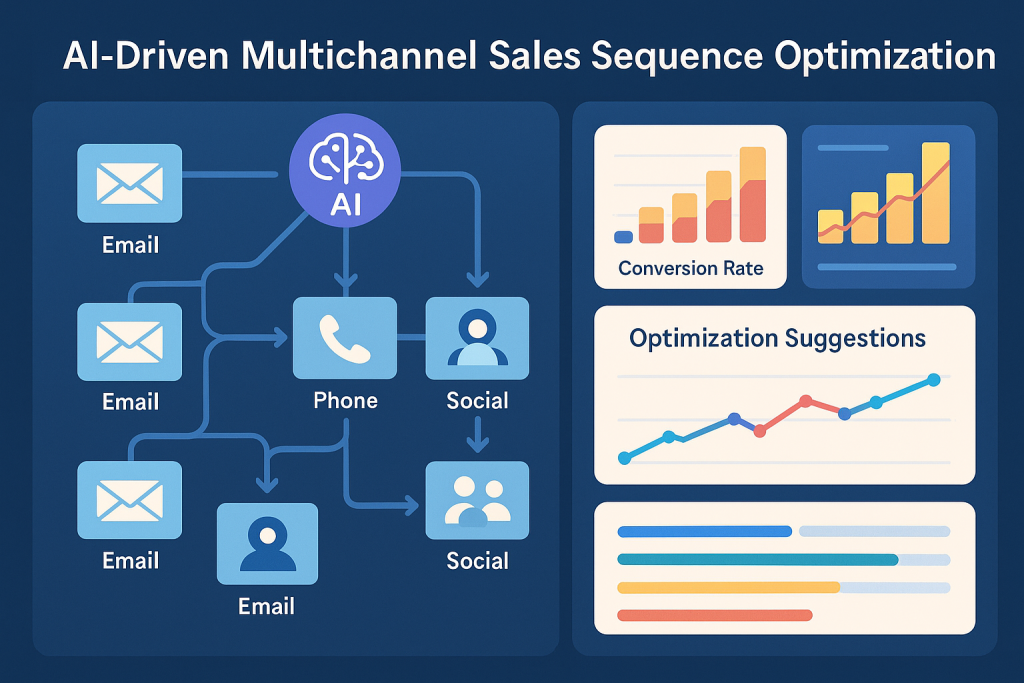Transform Your Sales Process with AI-Powered Sales Playbooks
In today’s competitive business landscape, the difference between a thriving sales operation and a struggling one often comes down to how effectively teams can engage prospects and move them through the sales funnel. Traditional sales methodologies—with their rigid scripts and inflexible sequences—are increasingly falling behind more dynamic, personalized approaches. This is where AI-powered sales playbooks are revolutionizing the game.
Whether you’re leading a sales team or looking to scale your outreach efforts, understanding how artificial intelligence can transform your sales process is no longer optional—it’s essential for staying competitive.

What Are AI-Powered Sales Playbooks?
AI-powered sales playbooks are intelligent, adaptive frameworks that guide sales representatives through customer interactions while continuously optimizing approaches based on real-time feedback and historical data. Unlike traditional sales scripts, these dynamic systems evolve with each interaction, learning what works and what doesn’t to improve conversion rates over time.
The Evolution of Sales Scripts
The journey from static scripts to intelligent playbooks represents a fundamental shift in how businesses approach sales conversations.
Traditional sales scripts have long suffered from significant limitations:
- Inflexibility – Unable to adapt to unexpected customer responses
- Generic messaging – One-size-fits-all approaches that fail to address specific customer needs
- Mechanical delivery – Often resulting in conversations that feel robotic and impersonal
- Outdated quickly – Require manual updates when market conditions or offerings change
These limitations created a gap between sales strategies and actual customer experiences. As prospects became more informed and expectations for personalization increased, the effectiveness of rigid scripts plummeted. This shift has driven the evolution toward more adaptive engagement models that can respond intelligently to each unique sales conversation.
Core Features of AI Sales Playbooks
Modern AI-powered sales playbooks offer sophisticated capabilities that transform how sales teams engage with prospects. Explore AI templates that can help you implement these features quickly in your sales process.
| Feature | Description | Business Impact |
|---|---|---|
| Real-time adaptation | Adjusts conversation flow based on prospect responses and engagement signals | 42% increase in meaningful conversations |
| Personalization at scale | Tailors messaging to individual prospects without manual intervention | 35% higher response rates |
| CRM integration | Seamlessly connects with existing customer data systems | 67% reduction in data entry time |
| Performance analytics | Provides detailed insights on conversation effectiveness and outcomes | 28% faster optimization cycles |
How AI Generates Effective Sales Scripts
The magic behind AI-powered sales playbooks lies in sophisticated language processing and machine learning technologies that analyze, learn from, and optimize sales conversations at scale.
Natural Language Processing in Sales Communications
Natural Language Processing (NLP) forms the foundation of intelligent sales playbooks, enabling systems to understand and generate human language in ways that feel natural and engaging.
Key NLP capabilities in sales contexts include:
- Sentiment analysis – Detecting emotional tones in prospect responses to gauge interest or objections
- Intent recognition – Identifying what prospects are actually asking for beyond their explicit words
- Entity extraction – Recognizing important business details mentioned during conversations
- Contextual understanding – Maintaining conversation coherence across multiple touchpoints
When a prospect mentions budget constraints, for example, an AI-powered playbook can immediately pivot the conversation toward value-based discussions rather than continuing with feature-focused pitches. This real-time adaptation feels natural to the prospect while maximizing the sales representative’s chances of addressing actual concerns.
Machine Learning for Script Optimization
Beyond understanding language, AI sales playbooks leverage machine learning to continuously improve performance over time.
The optimization process typically works through several mechanisms:
- Success pattern recognition – Identifying language patterns and conversation flows that lead to successful outcomes
- Automated A/B testing – Systematically comparing different approaches to determine which performs better
- Reinforcement learning – Rewarding the system for positive outcomes to reinforce effective strategies
- Cross-team learning – Applying successful approaches from top performers across the entire sales organization
This continuous improvement cycle means that AI sales playbooks become more effective with each conversation—learning from mistakes, amplifying successes, and adapting to changing market conditions without requiring manual intervention.

Add Your Heading Text Here
Dynamic Outreach Sequences That Adapt
Beyond individual conversations, AI transforms entire outreach sequences into intelligent, responsive systems that adapt based on prospect engagement patterns.
Multi-channel Sequence Orchestration
Modern buyers rarely stick to a single communication channel. AI sales playbooks excel at coordinating touchpoints across multiple platforms to create cohesive buying experiences.
Effective orchestration includes:
- Channel synchronization – Ensuring consistent messaging across email, phone, social, and other channels
- Timing optimization – Identifying ideal moments for each touchpoint based on prospect behavior
- Channel preference detection – Recognizing and prioritizing channels where individual prospects are most responsive
- Cross-channel context maintenance – Preserving conversation continuity as interactions move between channels
For example, when a prospect opens an email multiple times but doesn’t respond, the AI might trigger a follow-up call rather than another email. If social media engagement is high, the system might prioritize LinkedIn messages over other channels.
Behavioral Triggers and Decision Trees
The true power of AI sales playbooks comes from their ability to create dynamic, branching conversation paths based on prospect actions and responses.
These decision trees operate through:
- Engagement-based routing – Selecting next steps based on how prospects interact with previous communications
- Objection handling pathways – Activating specific messaging when certain objections are detected
- Interest acceleration – Increasing touchpoint frequency when strong buying signals emerge
- Automated re-engagement – Intelligently reviving conversations with stalled prospects
This behavioral responsiveness creates sequences that feel remarkably personalized to prospects while requiring minimal manual intervention from sales teams.
Personalization at Scale with AI
The promise of personalization has long been limited by the practical constraints of manual customization. AI-powered sales playbooks solve this fundamental challenge by enabling true personalization at scale.
Data-Driven Personalization Techniques
Effective AI personalization draws on multiple data sources to create highly relevant outreach:
- Firmographic targeting – Tailoring messages based on company size, industry, and structure
- Digital behavior signals – Incorporating website visits, content downloads, and other engagement data
- Technographic profiling – Customizing value propositions based on a prospect’s technology stack
- Buying stage adaptation – Adjusting messaging based on where prospects are in their buying journey
This data-powered approach ensures that each prospect receives messages that speak directly to their specific situation, dramatically increasing relevance and response rates.
Real-time Conversation Personalization
Beyond preparation, AI enables dynamic personalization during live interactions:
- Adaptive questioning – Modifying discovery questions based on previous answers
- Dynamic value proposition selection – Emphasizing benefits most likely to resonate with each prospect
- Contextual knowledge insertion – Weaving relevant industry insights into conversations
- Tone and pace matching – Adjusting communication style to align with the prospect’s preferences
Through these mechanisms, AI sales playbooks create conversations that feel deeply personalized while maintaining perfect consistency with brand voice and compliance requirements.
Implementing AI Sales Playbooks in Your Organization
Transforming your sales process with AI requires thoughtful implementation to ensure technical integration and human adoption.
Integration with Your Sales Tech Stack
Successful implementation begins with seamless technical integration:
- CRM data synchronization – Ensuring bidirectional flow of customer information
- Communication platform connections – Linking with email, calling, and messaging systems
- Analytics tool integration – Enabling comprehensive performance measurement
- Security and compliance configuration – Establishing appropriate guardrails and permissions
The goal is to create a unified system where AI playbooks can access necessary data and trigger appropriate actions across your entire sales technology ecosystem.
Training Sales Teams on AI Collaboration
Technical integration is only half the equation—human adoption is equally crucial:
- Role clarity – Helping teams understand how AI complements rather than replaces their expertise
- Gradual implementation – Starting with specific use cases before expanding
- Success showcasing – Highlighting early wins to build enthusiasm
- Feedback mechanisms – Creating channels for reps to contribute to AI improvement
When implemented correctly, sales teams quickly recognize AI playbooks as powerful allies that handle routine tasks while amplifying their uniquely human abilities to build relationships and solve complex problems.
Measuring Success: Key Metrics for AI Sales Playbooks
To ensure your AI sales playbooks deliver maximum value, establishing clear measurement frameworks is essential. Learn more about AI tools that can help you track and optimize your sales performance.
Conversion Metrics That Matter
While many metrics may improve with AI implementation, these core indicators provide the clearest picture of impact:
| Metric | Definition | Target Improvement |
|---|---|---|
| Response rate | Percentage of prospects who engage with outreach | 25-40% increase |
| Conversation-to-opportunity ratio | Conversations that convert to qualified opportunities | 15-30% increase |
| Sales cycle velocity | Time from first touch to closed deal | 20-35% reduction |
| Rep productivity | Number of quality conversations per rep per day | 30-50% increase |
Quality and Compliance Monitoring
Beyond conversion metrics, monitoring quality ensures long-term success:
- Message consistency scoring – Evaluating alignment with brand voice and positioning
- Compliance adherence – Tracking conformity with regulatory and legal requirements
- Conversation quality assessment – Measuring factors like relevance, personalization, and value delivery
- Customer sentiment tracking – Monitoring prospect reactions to AI-assisted communications
By balancing conversion metrics with quality indicators, you can ensure that AI playbooks drive immediate results while building sustainable customer relationships.
Conclusion: The Future of Sales Is Adaptive
As we’ve explored throughout this article, AI-powered sales playbooks represent a fundamental evolution in how sales organizations engage prospects and customers. By combining the efficiency of automation with the intelligence of machine learning, these systems enable levels of personalization, responsiveness, and optimization previously impossible at scale.
The most successful sales organizations of tomorrow won’t be those with the largest teams or the biggest budgets—they’ll be those who most effectively leverage AI to amplify human relationships while eliminating repetitive tasks.
The question is no longer whether to implement AI in your sales process, but how quickly and effectively you can harness its power to transform your results.
